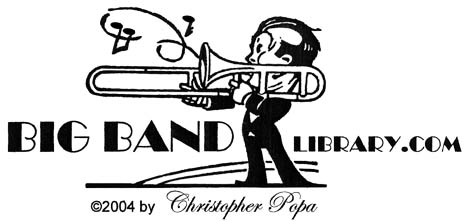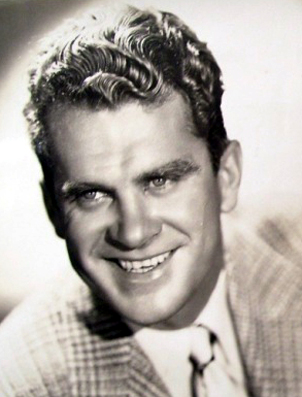
Their very first professional job was at the Dempsey Hotel in Macon, GA.
On January 29, 1938, billed as "Dean Hudson and Florida Clubmen," they made six sides for Bluebird, including Miami Dreams, which Brown sang.
The Clubmen name was dropped after a couple years, and they continued as Dean Hudson "and His Orchestra."
Brown ("Hudson") forged ahead, leading bands under that alias for the rest of his life, and, perhaps to commemorate the vicinity of his birthplace and the band's Florida heritage, he adopted Moon Over Miami as his theme song.
vital stats:
given name Marion Brown
birth Feb. 7, 1913, Lake Worth, FL
death Dec. 5, 1991 ( listed as "Dean A. Hudson" )
father T.N. Brown, a trumpeter and symphonic band director
mother a pianist
brother
wife Nancy Hudson, a vocalist
education graduate, University of Florida, Gainesville, FL, 1936
membership Boy Scouts
military service U.S. Army, late 1941-43
Hudson and his orchestra recorded a total of eight selections in March and August 1941 for Okeh, such as Holly Hop (Hot Chestnuts) and You're Gone, a vocal by Hudson and the Dixie Debs.
Between 1944 and 1950, they made many transcriptions for Lang-Worth.
They also recorded for Musicraft and a number of smaller labels.
He and his band became an annual attraction at the Cavalier Hotel in Virginia Beach, VA for 15 years, and also played during the 1940s and '50s at many of the nation's other top spots, including the Paramount Theatre in New York City; the Earle Theatre in Philadelphia, PA; the Trianon Ballroom in Chicago; the Steel Pier in Atlantic City, NJ; Copley Plaza in Boston, MA; and the Roosevelt Hotel in New Orleans, LA.
Instrumentalists in the Hudson band included, at various times, Ray Linn, trumpet; Mahlon Clark, clarinet and alto saxophone; and Lennie Love, piano.
"Dean Hudson" - In His Own Words
"I've played in famous hotels, ballrooms, tobacco warehouses, theatres, colleges, country clubs,
between the guns of the battle ship Missouri, on skis from Cypress Gardens, shopping centers, in
films, gyms, armories, from a C-47, riverboats, you name it and Dean has played there."
"Whenever Dorsey or any other big name leader lost a man when he was on the road, he would call
his manager and say, 'Call Dean Hudson's third sax or first trumpet. He has a good one and we
can beat his salary.' That's the way it was, but Dorsey was a true friend also. Our band guested
on 'Tommy Dorsey's Fame and Fortune Show' and in the late 40s, Dorsey put over $15,000 into my
band, but the days of building a big band were over."
"We were rolling along fine until 1955 when we played opposite Chubby Checker. I knew then that
rock was in and the big-band sound was on the way out."
In later years, Hudson ran a booking agency in Atlanta, then Decatur, GA, and continued to occasionally front bands at college proms, private balls, or conventions.
At an appearance at the Columbia Inn in Columbia, SC on September 28, 1981, Hudson played quite a few medleys, including ones in tribute to fellow bandleaders Russ Morgan and Guy Lombardo.
Hudson's final recordings were done on January 29, 1982 for George H. Buck's Circle label, and included former Glen Gray musician Billy Rauch on trombone.
The ambition never left him.
sources:
Harold B. Bachman, The Biggest Boom in Dixie: The Story of Band Music at the University
of Florida (Gainesville, FL: Paramount, 1968), pp.29-30.
Paul Brenner, liner notes, "Dean Hudson and His Orchestra: More 1941 and 1948," Circle
CLP-86, 1984 [ later expanded on CD as "More 1944-1950," Circle CCD-86, in 2001 ].
Wendell Echols, "Dean Hudson: The Pied Piper of Band Land," liner notes to "Dean
Hudson and His Orchestra Now! 1982," Circle CLP-40, 1982 [ later issued on CD as
CCD-40 in 2004 ].
Charles Garrod, Dean Hudson and His Orchestra (Zephyrhills, FL: Joyce Record Club,
1992).
Dean Hudson, liner notes, "Dean Hudson and His Orchestra 1944-1948," Circle CLP-13,
1981 [ later expanded on CD as "1944-1950," Circle CCD-13, in 1996 ].
---, "Dean Hudson Remembers the Band Years," liner notes to "Dean Hudson and His
Orchestra, 1944-1950: Volume Three," Circle CCD-136, 1988 [ issued on CD in 1997 ].
Roger D. Kinkle, "Hudson, Dean," in The Complete Encyclopedia of Popular Music and
Jazz 1900-1950: Volume 2 Biographies A Through K (New Rochelle, NY; Arlington
House Publishers, 1974), p.1137.
Brian Rust, "Dean Hudson," in The American Dance Band Discography 1917-1942:
Volume 1 Irving Aaronson to Arthur Lange (New Rochelle, NY; Arlington House
Publishers, 1975), p.823.
Social Security Death Index.
Norman Tarlin, "Georgia - Game Dance Planned for Saturday: Hudson Orchestra to Play
At Biltmore Exhibit Hall," The [ Georgia Institute of Technology ] Technique, Nov. 27,
1951, p.1+.
I would like to expand this tribute, if possible, with a new interview of someone who was important to Dean Hudson's life and career. Are you an alumnus of his band, a member of his family, or a collector who is knowledgeable about his accomplishments? Please contact me via e-mail
return to "Biographical Sketches" directory
go to Big Band Library homepage
The big bands are back
in a new and exciting way!
DEAN HUDSON
"HE HAD AMBITION"
by Music Librarian CHRISTOPHER POPA
July 2009
He was a trumpeter and singer whose band originated at the University of Florida, where he and some fellow musicians had performed as the "Clubmen," first under the leadership of Eli Katz, who used a made-up name, "Dean Hudson," which had been selected in a contest.
When Katz graduated (he went on to become a lawyer in Miami), another leader had to be chosen - one who, to help perpetuate the band, was willing to retain the fictitious moniker "Dean Hudson."
Brown, who later remarked that he majored in "ambition" at the University, was picked, and the Clubmen stayed together after graduation in 1936.

Marion Brown, the second "Dean Hudson"